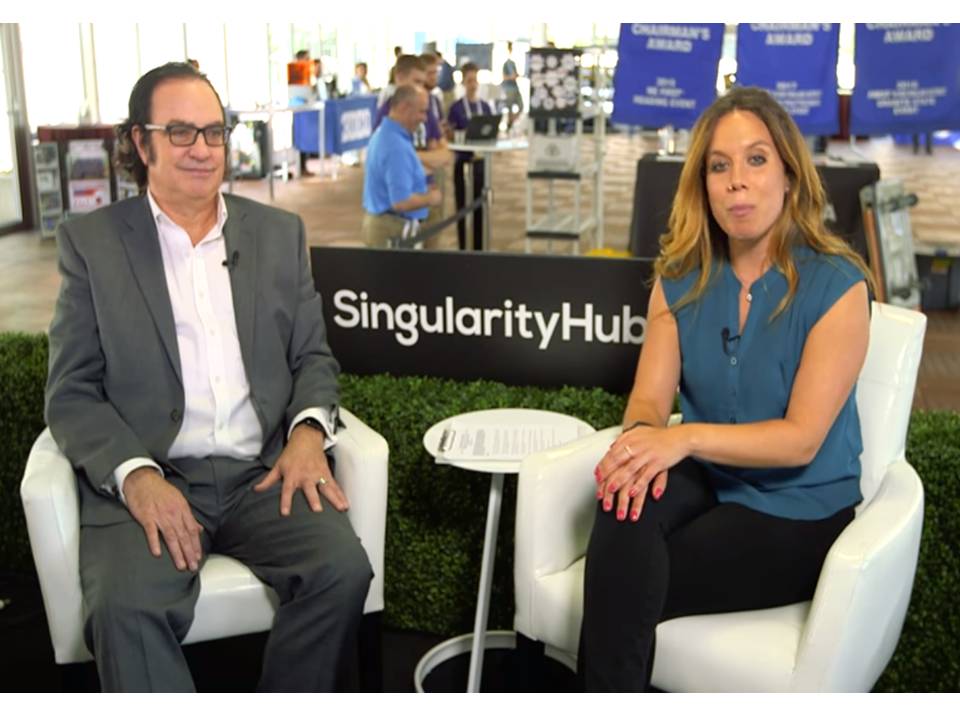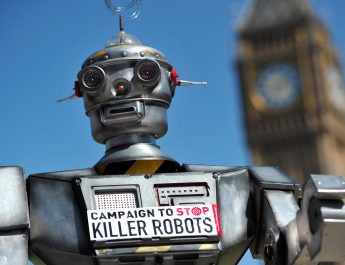Neil Jacobstein, Chair of A.I. and Robotics, interviewed by Alison E. Berman of Singularity Hub, on the A.I. trends for 2017 and beyond..
Alison E. Berman, Staff Writer |
I’m Alison Berman with Singularity Hub, and we are here at Exponential Manufacturing Conference on day one, and today, I’m with Neil Jacobstein, who is our chair of Artificial Intelligence and Robotics at Singularity University. He’s also on the founding editorial board at Science Magazine Science Robotics Journal, and he’s a distinguishing visiting scholar at Stanford mediaX. Additionally, he’s in a three-year appointment at the National Academy of Science, Engineering and Medicine.
People say 2016 was the year of VR, and 2017 is like the year of Artificial Intelligence. Some people are also saying, “Oh, well, Artificial Intelligence has so much hype around it. What do you see in terms of like real, applicable AI in 2017, like, its highest leverage point?

Neil Jacobstein, Chair of A.I. and Robotics |
Well, it’s so interesting. I’ve been in the field quite a while and it’s so interesting to have the media decide that “This is the year of AI”. And, you know, these are all media designations, and in fact, Artificial Intelligence has been doing, the field of AI has been delivering substantive work for decades. It’s improved a lot over that time. The hardware has improved. The algorithms have improved dramatically. The access to data has improved. And overall, the systems are less brittle, and they learn by themselves. They don’t have to have a white-coated engineer build up the knowledge base. But these systems have been really useful for quite a while. And now what’s changed is in 2017. The technology is now so available that you don’t have to have super-skilled people using it. Still takes some skill, and for complex problems, considerable skill. But now you can have people applying the technology using toolkits and framework and products to a wide variety of problems in industry, from design to quality control to manufacturing to customer service. I mean, across the board. And you’re seeing really good results now.

Alison E. Berman, Staff Writer |
What do you feel most excited about in artificial intelligence right now? Is there something you really have your eye on?
Neil Jacobstein, Chair of A.I. and Robotics |
Well, yes, there are three things and I’m really excited about:
One is a forthcoming revolution in healthcare that will be fueled by the availability of new classes of data, genomics data, wearables data, and real-time data of the human organism under certain conditions like stress and exercise and things, and we’ll be able to combine that with unparalleled pattern recognition, and combine that with crowd-sourcing other people’s data. So we can separate out a particular mutation and its phenotypic expression and how it shows up in the population in every individual that has that mutation, and we can sort of figure out what that mutation is doing and what it’s not doing. And that, I mean, not in all cases, in every case, but we can do a much better job than we did in the past, and I think AI will lead to really improved health care.
Another thing that we’ll see is the advent of very robust self-driving cars. We already have them in use on small pilot tests all over the world, but I think we’ll see them coming in in force and dramatically decreasing the death rates on our highway. Currently we kill 1.2 million people around the world, and up to 40,000 people in the US alone. And that number has gone up recently because of distracted driving, like texting while driving, and we can radically cut those numbers with self-driving cars, and very young people today will probably not get licenses, and they’ll look on the act of driving as barbaric. You know, why would you put a primate behind the wheel?
And then one other area is AI in R&D, Research and Development. There’s a lot of heavy lifting and pattern recognition that can be done by AI in the process of being an assistant or associate to a scientist or researcher in the laboratory. And I’m very excited about that.
Alison E. Berman, Staff Writer |
Touching on the theme of automation, which is definitely big here, do you think that companies which are creating AI systems or robotic systems that will eliminate jobs, do you think they hold a type of responsibility for jobs that may be taken from human workers? What are your thoughts on that?
Neil Jacobstein, Chair of A.I. and Robotics |
Well, I’m happy to share my thoughts with you on that, but these are my thoughts, not the party line of the University. I do think that there’s a responsibility for doing that. I think that we need to be proactive in thinking about what the impact of automation may be on the workforce, and it’s not just the blue-collar workforce. It could easily be the white-collar workforce, and in many cases, it’s the middle class that gets hollowed out first. So I think that there are people who say, technologists who say, well, AI and robotics will create all kinds of new jobs. And they’re right about that. They will create new jobs, for people who do AI and robotics, and also ecosystem of jobs around them. But the question really is, what’s the ratio jobs destroyed to jobs created? And I think that eventually, we may have a world of not just abundance of material goods but abundance of choices for work on jobs people want because they’ll have a lot of material goods, and they can do the jobs that they find fulfilling. But for now, we distribute wealth that way, and there will be a lot of disruption, I think, in the short term. So I think there is a special responsibility on the part of AI, robotics, and automation companies to think through those issues and help their workers crosstrain and uptrain, upscale, and also maybe to help create experimental programs on basic income, and to think ahead about what the impacts are going to be. Because if we don’t, and it turns out that that ratio is unfavorable, there’ll be a lot of disruption in society.
Alison E. Berman, Staff Writer |
Certainly. So, circling back to, you touched on universal basic income, do you view this as a viable option for helping in a world where many jobs are automated?
Neil Jacobstein, Chair of A.I. and Robotics |
Well, I think that it’s always preferable if people can crosstrain and upscale. That’s great. But I think that it’s smart for society to experiment with basic schemas, different schemas, for doing universal basic income, because that way, we’re protected against some of the downside risk if it turns out that it’s really a lot of people that are losing their jobs simultaneously. And in fact, I think that we will have an opportunity to have people do much more fulfilling jobs if they don’t have to worry about what am I going to do for a living. I have some friends that say. “Oh, we shouldn’t do basic minimum incomes or universal incomes because it’ll rob the poor of their self-esteem”, and what I say to that is.” Look, let’s make sure that people who are having trouble economically can feed their kids and make sure they have good health care and access to good education and a shelter over their heads, and then let’s worry about their self-esteem. And I think self esteem matters, and we should counsel them and give them access to lots of education and training to learn things that would be great for their self-esteem.
Alison E. Berman, Staff Writer |
Definitely.. And so zooming out just a little bit. Artificial Intelligence is pretty pervasive in a lot of science fiction films and novels. Do you feel that these science fiction representations of AI are helping the field harming the field?
Neil Jacobstein, Chair of A.I. and Robotics |
Well, it’s been going on for quite some time now. You know, we have AIs and robots being portrayed for decades in the media. But I think it doesn’t help when the makers of movies realize that they can jack into people’s nervous systems and get their fear responses to excrete epinephrines and, you know, endorphins sometimes, and basically hijack their nervous systems in order to sell tickets, because under those conditions, they don’t have to be completely responsible about a nuanced view of AI of robotics. It’s usually some AI or robot that goes amok and then the hero of the movie has to fix it. So I think that’s a very simplistic sort of genre of movies. There are a few exceptions, but I think it would be better to have a much more nuanced view of the future, of the possibilities, the positive possibilities of the future, instead of endless dystopias. I think we ought to have some movies that portray a really desirable future, and Star Trek as one example of that.
Alison E. Berman, Staff Writer |
I completely agree and I am a huge Star Trek fan.




